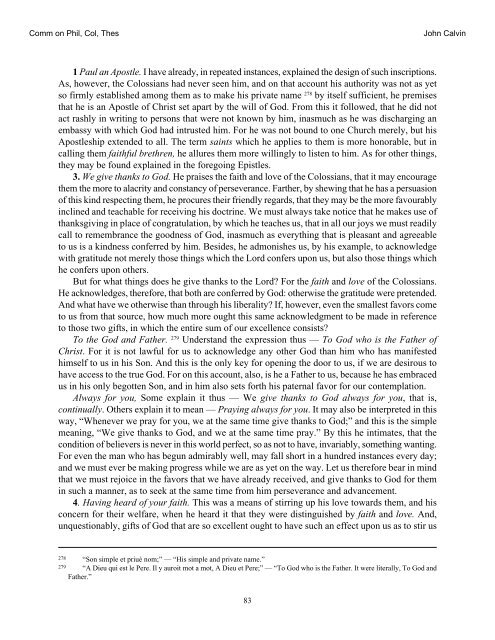Commentary on Philippians, Colossians, and Thessalonians
Commentary on Philippians, Colossians, and Thessalonians
Commentary on Philippians, Colossians, and Thessalonians
You also want an ePaper? Increase the reach of your titles
YUMPU automatically turns print PDFs into web optimized ePapers that Google loves.
Comm <strong>on</strong> Phil, Col, Thes<br />
1 Paul an Apostle. I have already, in repeated instances, explained the design of such inscripti<strong>on</strong>s.<br />
As, however, the <strong>Colossians</strong> had never seen him, <strong>and</strong> <strong>on</strong> that account his authority was not as yet<br />
so firmly established am<strong>on</strong>g them as to make his private name 278 by itself sufficient, he premises<br />
that he is an Apostle of Christ set apart by the will of God. From this it followed, that he did not<br />
act rashly in writing to pers<strong>on</strong>s that were not known by him, inasmuch as he was discharging an<br />
embassy with which God had intrusted him. For he was not bound to <strong>on</strong>e Church merely, but his<br />
Apostleship extended to all. The term saints which he applies to them is more h<strong>on</strong>orable, but in<br />
calling them faithful brethren, he allures them more willingly to listen to him. As for other things,<br />
they may be found explained in the foregoing Epistles.<br />
3. We give thanks to God. He praises the faith <strong>and</strong> love of the <strong>Colossians</strong>, that it may encourage<br />
them the more to alacrity <strong>and</strong> c<strong>on</strong>stancy of perseverance. Farther, by shewing that he has a persuasi<strong>on</strong><br />
of this kind respecting them, he procures their friendly regards, that they may be the more favourably<br />
inclined <strong>and</strong> teachable for receiving his doctrine. We must always take notice that he makes use of<br />
thanksgiving in place of c<strong>on</strong>gratulati<strong>on</strong>, by which he teaches us, that in all our joys we must readily<br />
call to remembrance the goodness of God, inasmuch as everything that is pleasant <strong>and</strong> agreeable<br />
to us is a kindness c<strong>on</strong>ferred by him. Besides, he adm<strong>on</strong>ishes us, by his example, to acknowledge<br />
with gratitude not merely those things which the Lord c<strong>on</strong>fers up<strong>on</strong> us, but also those things which<br />
he c<strong>on</strong>fers up<strong>on</strong> others.<br />
But for what things does he give thanks to the Lord? For the faith <strong>and</strong> love of the <strong>Colossians</strong>.<br />
He acknowledges, therefore, that both are c<strong>on</strong>ferred by God: otherwise the gratitude were pretended.<br />
And what have we otherwise than through his liberality? If, however, even the smallest favors come<br />
to us from that source, how much more ought this same acknowledgment to be made in reference<br />
to those two gifts, in which the entire sum of our excellence c<strong>on</strong>sists?<br />
To the God <strong>and</strong> Father. 279 Underst<strong>and</strong> the expressi<strong>on</strong> thus — To God who is the Father of<br />
Christ. For it is not lawful for us to acknowledge any other God than him who has manifested<br />
himself to us in his S<strong>on</strong>. And this is the <strong>on</strong>ly key for opening the door to us, if we are desirous to<br />
have access to the true God. For <strong>on</strong> this account, also, is he a Father to us, because he has embraced<br />
us in his <strong>on</strong>ly begotten S<strong>on</strong>, <strong>and</strong> in him also sets forth his paternal favor for our c<strong>on</strong>templati<strong>on</strong>.<br />
Always for you, Some explain it thus — We give thanks to God always for you, that is,<br />
c<strong>on</strong>tinually. Others explain it to mean — Praying always for you. It may also be interpreted in this<br />
way, “Whenever we pray for you, we at the same time give thanks to God;” <strong>and</strong> this is the simple<br />
meaning, “We give thanks to God, <strong>and</strong> we at the same time pray.” By this he intimates, that the<br />
c<strong>on</strong>diti<strong>on</strong> of believers is never in this world perfect, so as not to have, invariably, something wanting.<br />
For even the man who has begun admirably well, may fall short in a hundred instances every day;<br />
<strong>and</strong> we must ever be making progress while we are as yet <strong>on</strong> the way. Let us therefore bear in mind<br />
that we must rejoice in the favors that we have already received, <strong>and</strong> give thanks to God for them<br />
in such a manner, as to seek at the same time from him perseverance <strong>and</strong> advancement.<br />
4. Having heard of your faith. This was a means of stirring up his love towards them, <strong>and</strong> his<br />
c<strong>on</strong>cern for their welfare, when he heard it that they were distinguished by faith <strong>and</strong> love. And,<br />
unquesti<strong>on</strong>ably, gifts of God that are so excellent ought to have such an effect up<strong>on</strong> us as to stir us<br />
278 “S<strong>on</strong> simple et priué nom;” — “His simple <strong>and</strong> private name.”<br />
279 “A Dieu qui est le Pere. Il y auroit mot a mot, A Dieu et Pere;” — “To God who is the Father. It were literally, To God <strong>and</strong><br />
Father.”<br />
83<br />
John Calvin















